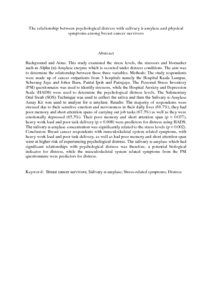Citation
Yong, H. W. and Hashim, Zailina and Jamil @ Osman , Zubaidah and Moin, Saidi and Yong, H. Y. and Mohd Shariff, Zalilah
(2013)
The relationship between psychological distress with salivary á-amylase and physical symptoms among breast cancer survivors.
Health, 5 (4).
art. no. 30194.
pp. 811-816.
ISSN 1949-4998; ESSN: 1949-5005
Abstract
Background and Aims:
This study examined the stress levels, the stressors and biomarker such as Alpha (α)-Amylase enzyme which is secreted under distress conditions. The aim was to determine the relationship between these three variables.
Methods:
The study respondents were made up of cancer outpatients from 3 hospitals namely the Hospital Kuala Lumpur, Seberang Jaya and Johor Baru, Pantai Ipoh and Putrajaya. The Personal Stress Inventory (PSI) questionnaire was used to identify stressors, while the Hospital Anxiety and Depression Scale (HADS) were used to determine the psychological distress levels. The Salimentary Oral Swab (SOS) Technique was used to collect the saliva and then the Salivary α-Amylase Assay Kit was used to analyse for α amylase.
Results:
The majority of respondents were stressed due to their sensitive emotion and nervousness in their daily lives (68.7%), they had poor memory and short attention spans of carrying out job tasks (67.3%) as well as they were emotionally depressed (65.3%). Their poor memory and short attention span (p = 0.037), heavy work load and poor task delivery (p = 0.008) were predictors for distress using HADS. The salivary α-amylase concentration was significantly related to the stress levels (p = 0.002).
Conclusion:
Breast cancer respondents with musculoskeletal system related symptoms, with heavy work load and poor task delivery, as well as had poor memory and short attention span were at higher risk of experiencing psychological distress. The salivary α-amylase which had significant relationships with psychological distress was therefore, a potential biological indicator for distress, while the musculoskeletal system related symptoms from the PSI questionnaire were predictors for distress.
Download File
![[img]](http://psasir.upm.edu.my/29786/1.hassmallThumbnailVersion/The%20relationship%20between%20psychological%20distress%20with%20salivary%20%C3%A1.pdf)  Preview |
|
PDF (Abstract)
The relationship between psychological distress with salivary á.pdf
Download (152kB)
| Preview
|
|
Additional Metadata
Actions (login required)
 |
View Item |

